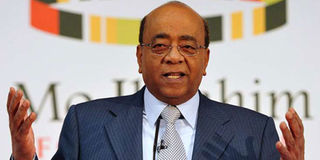Kenya improves in governance ranking

Mo Ibrahim, founder of the Mo Ibrahim Foundation, speaks during the launch of the 2013 Ibrahim Index of African Governance (IIAG) in London on October 14, 2013. According to its 2017 report, Kenya's lowest category score was in participation and human rights. PHOTO | EVANS HABIL | NATION MEDIA GROUP
What you need to know:
- The foundation provides an annual assessment of the quality of governance in African countries.
- Its report is deemed to be the most comprehensive collection of data on African governance.
Kenya has registered an overall improvement in governance over the past decade, a report shows.
According to the Mo Ibrahim Index of African Governance that was released in Dakar, Senegal, on Monday, Kenya scored 59.3 per cent in overall governance, ranking 13th in Africa.
In 2015, the country scored 58.8 per cent and was ranked 14th on the continent.
It was among the top 10 most improved countries in Africa.
HUMAN RIGHTS
The latest report shows that the country’s overall governance progress over the decade was driven by four categories.
These are safety and the rule of law; participation and human rights; sustainable economic opportunity; and human development.
Kenya achieved its highest category score in human development, at 67.1 per cent.
Its lowest category score was in participation and human rights, at 56.2 per cent.
“As the index shows us, overall governance in Africa is improving. This is good news.
"However, the slowing and, in some cases, even reversing trends in a large number of countries, and in some key dimensions of governance, means that we must be vigilant.
"Without vigilance and sustained efforts, the progress of recent years could be in danger of vanishing,” Mr Mo Ibrahim, the chairman of the Mo Ibrahim Foundation, said.
INTRASTRUCTURE
The foundation, which released its 11th report, looks at both country and indicator trends over the past five years, by evaluating more recent progress in governance alongside long-term performance.
It also provides an annual assessment of the quality of governance in African countries.
Its report is deemed to be the most comprehensive collection of data on African governance.
The document shows that infrastructure picked up momentum over the past five years in most countries, while civil society participation in most countries worsened.





